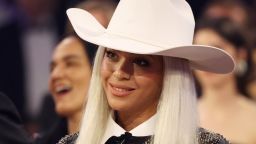Country music runs deep in the blood of Black folks.
And Beyoncé’s bold, brilliant new album “Act II: Cowboy Carter,” which dropped Friday, is no exception to those musical roots. Instead, it is a continuation, or a reclamation, if you will, of the deep connection that Black Americans have to country music in this country and beyond.

Roxanne Jones
CNN
It was from Africa that the banjo, the signature instrument of country music, arrived on our nation’s shores. And from the souls of those enslaved Black people sprang a cacophony of beautiful musical sounds, from gospel, jazz and rhythm and blues to rock, rap and country. Long before there were racially-tinged musical genres created to segregate and monetize music, there was just great music.
If not for the ever-present racism that disrupts and often dictates what spaces Black women can inhabit in society, Beyoncé’s country music album would be no big deal. There’d be no social media backlash, or radio stations refusing to play her music because it just wasn’t country enough. “Cowboy Carter” would be judged solely on its musical merits and everyone would move on.
But that is not the America we live in. And most often, in order to reach our creative and professional best, Black women must resist and work constantly to reclaim our own narratives.

By refusing to be musically and culturally contained, Beyonce has given country music a boost that could only have come from one of the world’s top entertainers. Her wildly-successful single from the album, “Texas Hold ‘Em” made Beyoncé the first Black woman to hit number one on the country charts.
And that is why this history-making album is being celebrated.
According to Alice Randall, a country music songwriter and author of “My Black Country,” “Beyoncé has blasted through the intended and not intended boundaries, the cultural redlining.” She told NPR about “Cowboy Carter” that Beyoncé “has ascended to a height no other black women has ascended to in the country. This is a tribute to her own genius and it spotlights the genius that came before.”
Randall is referring to the many great Black country music artists who no doubt led the way for Beyoncé. Country music pioneer Linda Martell intros two songs on the album. Her 1970 album, “Color Me Country,” was the first major release by a Black female artist in country. Martell, now 82, was the first Black woman to perform solo at the Grand Ole Opry, country music’s most important stage located in Nashville, Tennessee.
For a brief time in the 1960s and 1970s, Black country music artists received some commercial success and recognition. Ray Charles’ landmark 1962 album “Modern Sounds in Country and Western Music” topped the charts, The Pointer Sisters’ 1974 hit “Fairytale” won a Grammy for Best Country Vocal Performance, a first for an all-female group.

And Charley Pride, perhaps country music’s most famous Black singer, had 29 number ones on Billboard’s Hot Country Songs chart and more than 50 Top Tens.
It was in 2022 that the Grand Ole Opry issued an apology to the family of late harmonica player DeFord Bailey, one of the most important stars of early country music, for mistreating Bailey and “suppressing the contributions of our diverse community.” Also known as the “Harmonica Wizard,” Bailey was a founding member of the Grand Ole Opry itself. And, though he’s in the Country Music Hall of Fame today, Bailey was never recognized for his countless contributions to the genre.
Growing up, the stars of our annual family reunion were always a group of cousins in their 80s whose claim to fame in the family was that they had once played at the Grand Ole Opry. We never quite knew if it was just family folklore but what we did know was that when Uncle Wilbur broke out that banjo and his band began picking up their washboards, spoons and harmonicas — it was about to be a backyard throw-down. I still smile when I remember how we all tried to learn how to play spoons. It’s not as easy as it looks.
Country music roots run deep in many Black families like mine, even those of us who never lived “down South.” It will always be the music of our ancestors that still touches our soul and carries us forward, no matter what commercially-acceptable label is forced on the music.
I hear those ancestors in “Cowboy Carter.”
Her song, “Protector,” took me on a beautiful journey back to when my son was first born. I recalled the countless nights I spent, rocking him to sleep to the sounds of Patsy Cline, Ray Charles, Dolly Parton and other favorites.
Bey perfectly captured my feelings as a new mom — full of love and hope for the future. And of the silent vow I made back then to be my child’s protector, shining a light for him as long as I walked this earth.
The best country music will touch our souls by telling stories of regular, everyday lives — our triumphs and our struggles, the breakups and the makeups, the joy and the pain.
And by this measure, I’d say Beyoncé’s second act, “Cowboy Carter,” is indeed classic country music.





